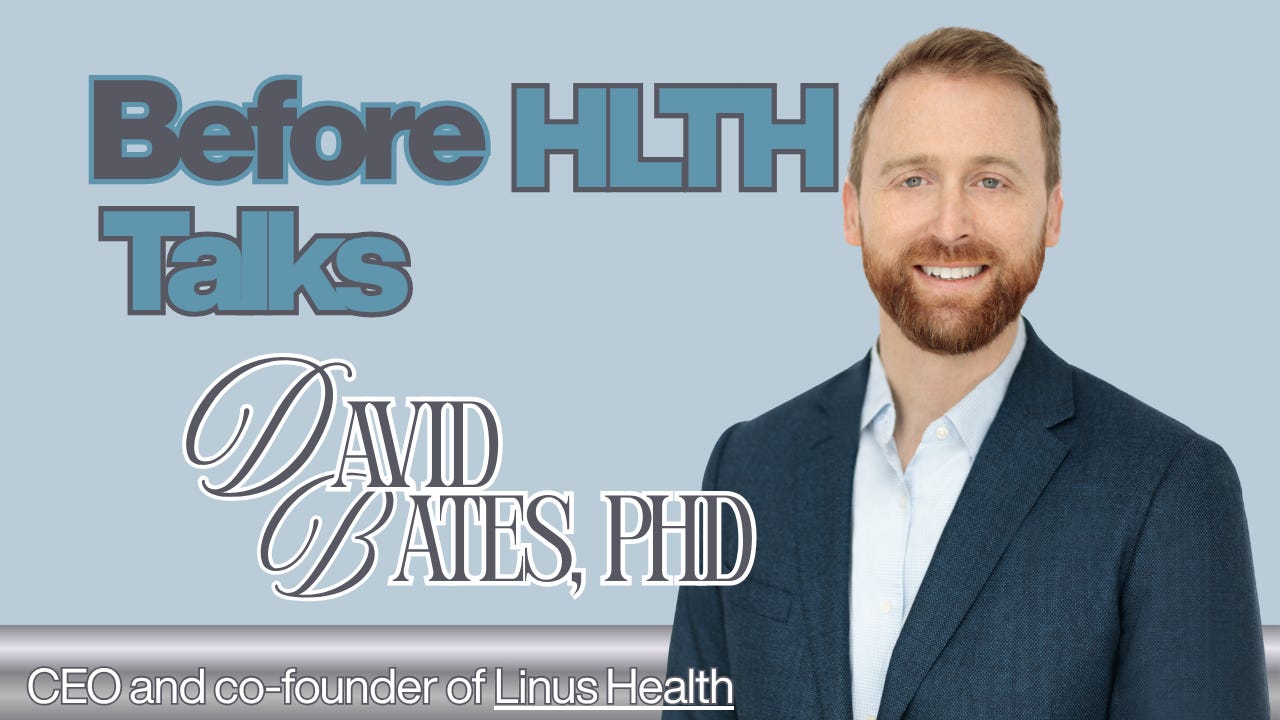Before HLTH Talks: Dr. David Bates
How AI Is Changing Brain Health Forever
Every year, through my Before HLTH Talks: Voices of Change series, I highlight those rare voices in healthcare technology who are not chasing the next trend, but instead shaping the next era of care.
And today, that spotlight is on Dr. David Bates, CEO and co-founder of Linus Health. This company is redefining what it means to catch disease early, act decisively, and preserve quality of life for millions.
The Shift From Reactive to Preventive Care
We’re living in an era where data and analytics can finally move faster than disease.
Dr. Bates and the Linus Health team are proving that early detection is not just possible; it’s practical.
“I am excited about the growing momentum around applying AI to health conditions that have historically been difficult to detect early, such as Alzheimer’s disease. We are starting to see data analytics used not only to identify population health management trends, but also to identify individuals at risk much earlier and help personalize their care.”
This mindset marks a fundamental shift in medicine — from reactive to predictive, from late-stage intervention to early action.
In cognitive health, that means using AI to recognize subtle changes in behavior or brain function that may appear up to seven years before traditional diagnostic methods can detect them. That kind of lead time doesn’t just change a diagnosis; it changes a life.
Validation Matters More Than Velocity
There’s no shortage of AI tools in healthcare today, but few are as rigorously validated as those being developed by Linus Health.
“Scientific validation is essential. We are at a point in digital health where enthusiasm for AI is high, but the real test is whether solutions consistently deliver accurate and reliable results in clinical settings.”
Dr. Bates is refreshingly transparent about this: innovation without validation doesn’t last.
Linus Health takes the same evidence-based approach used in pharmaceutical and medical device development — peer-reviewed studies, real-world validation, and clinical trials across diverse populations.
It’s this kind of scientific discipline that gives both clinicians and patients something rare in the AI era: trust.
Bringing Brain Health Home
One of the most exciting parts of the Linus Health mission is how it brings world-class brain health tools closer to patients — literally.
“The innovations that will matter most are those that expand access without sacrificing quality. This means tools that can be used in patients’ homes while still meeting clinical standards.”
Imagine validated, at-home assessments that can screen for cognitive decline in minutes.
Imagine clinicians using that data to triage faster, reduce bottlenecks, and intervene earlier — not months later when symptoms become irreversible.
This is how AI can solve one of healthcare’s biggest challenges: early detection at scale.
Equity by Design
AI is only as powerful as the data it’s built on. Dr. Bates understands that building equitable healthcare technology requires intentionality from the start.
“AI must be trained and validated across large, diverse populations and deployed in ways that reduce, not widen, disparities.”
That’s the real meaning of equity by design — not an afterthought, but a framework.
Linus Health’s approach ensures that every digital tool they deploy, from early detection algorithms to at-home assessments, performs reliably across populations, age groups, and socioeconomic backgrounds. It’s AI as an equalizer, not a divider.
The Missed Opportunity in Mild Cognitive Impairment
Dr. Bates is also drawing attention to one of healthcare’s biggest blind spots: mild cognitive impairment (MCI).
“More than 90% of individuals with MCI remain undiagnosed, despite its known role as an early indicator of more serious cognitive decline.”
That’s an astounding statistic — and a call to action.
By detecting MCI earlier, clinicians can alter the disease's progression and significantly reduce long-term healthcare costs.
Linus Health is helping the industry move past the reactive mindset that dominated medicine for decades. Just as mammograms revolutionized cancer detection, AI-powered brain health assessments can do the same for Alzheimer’s and other cognitive conditions.
A New Era of Proactive Brain Health
Dr. Bates’s hope for HLTH 2025 mirrors a broader industry shift: aligning stakeholders around prevention and early detection.
“My hope is that we leave HLTH with more momentum around prevention and early detection as pillars of data-driven care.”
For Linus Health, prevention isn’t just an ideal — it’s a measurable goal.
By equipping clinicians with actionable insights and giving patients tools to engage with their own brain health, the company is proving that proactive care can be both scalable and personal.
It’s the kind of innovation that doesn’t just improve outcomes; it changes expectations.
Why Linus Health Deserves Your Attention
I’ve followed Linus Health for a while now, and what stands out isn’t just their technology — it’s their purpose.
They are building a healthcare future where the ability to detect, prevent, and protect brain health belongs to everyone.
Dr. Bates and his team are on a mission to change how the world sees brain health — and how soon we act to preserve it.
If you’re attending #HLTHUSA, don’t miss an opportunity to speak with the Linus Team. They will be located in the Digital Health Hub Pavilion at kiosk #1760. This is the kind of innovation that should be shaping your strategy, your partnerships, and your investment in what’s next.
👉 Register now → https://hlth.com/events/usa/
🧩 This is part of my Before HLTH Talks: Voices of Change series, where I spotlight leaders who are defining healthcare’s future through action, not rhetoric.
#BeforeHLTHTalks #VoicesOfChange #HLTH2025 #BrainHealth #DigitalHealth #AIinHealthcare #DataDrivenCare #HealthcareInnovation #LinusHealth #EarlyDetection #CognitiveCare


